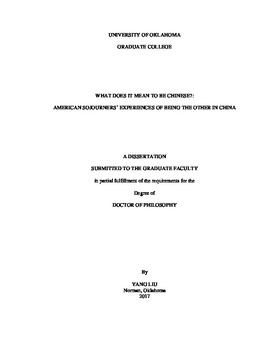| dc.description.abstract | This study is an examination of American sojourners’ intercultural experiences in China, and an exploration of their identity of being the Other, emerging from intercultural encounters. Through participants’ self-descriptions, this study provides a new conceptual understanding of sojourners’ Otherness and how American sojourners’ Other-identity, as a socio-cultural construct, is ascribed during social interactions with the Chinese, embedded in a particular asymmetric power distribution. The mixed methods design used for this study included data collected through questionnaires and subsequent in-depth interviews. Quantified value changes experienced by each American sojourner during their intercultural experience in China were measured first. These results informed the subsequent in-depth interviews, aimed to better capture the ways in which social interactions with the Chinese impact sojourners’ Other-identity. Grounded theory guided data collection and data analysis. A total of 35 American sojourners were recruited for this study. All first came to China as international students and at the time of the interviews were studying or living in China. Through comparative analysis, this study reveals that American sojourners were exoticized, stereotyped, and ostracized Others in China, based almost exclusively on their phenotypical and cultural distinctiveness, as interpreted by the Chinese. Unlike sojourners and immigrants flowing from less advanced countries to developed ones, American sojourners, for whom relocation is reversed, are placed in the position of socially superior minority in China as a result of the socially superior standing extended to United States citizens, based on their standing in the world, and the global White supremacy. Analogous to sojourners and immigrants in many other countries, American sojourners are treated as powerless outsiders in the host country. They are categorized as members of the out-group by the Chinese through the use of objectification, generalization, alienation, and stereotyping in both verbal and nonverbal channels. When the Chinese perceive threats from American sojourners, the latter are further ostracized as disrespectful, untrustworthy, and threatening Other, and are segregated and even rejected by the Chinese national in-group. American sojourners declare that it is impossible for them to be fully accepted by Chinese society and, therefore, they are permanently viewed as the Other or outsiders in China. Unchangeable cultural markers, such as skin color, along with deeply held cultural values combine to produce this perception of insurmountable differences in the view of the sojourners. However, the Americans admit they still can carve their own niches in Chinese society by using their Other-identity to pursue opportunities exclusive to Westerners and/or untapped markets in China. As cultural fusion theory describes, sojourners and immigrants fuse their original Self-identity with their newly acquired Other-identity, which enables them to expand their horizons of understanding the world, increase their tolerance for people who are different from them, and gain new perspectives on how they see the world, others, and themselves. Specific ideas about orientation and training are offered, designed to make transitions into a new culture less difficult, and to improve the perceptions and knowledge of host country individuals who work directly with sojourners and immigrants. | en_US |
